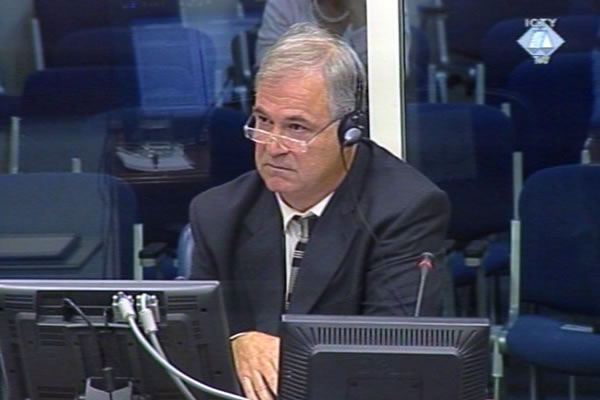Home
INEFFECTIVE ORDERS TO IMPROVE EFFECTIVENESS
In his evidence as Ivan Cermak’s defense witness, former Croatian official Zdenko Rincic contends that after Operation Storm the accused general issued ‘requests’ to both civilian and military police. Cermak didn’t have the authority to issue orders, but he did so sometimes, to improve effectiveness, although he knew the orders would not be carried out
 Zdenko Rinčić, svjedok odbrane Ivana Čermaka
Zdenko Rinčić, svjedok odbrane Ivana Čermaka The defense case of Ivan Cermak continued with the evidence of a witness who was introduced only by his surname, Rincic. After his brief examination-in chief it was unclear why he had been called before Judge Orie’s Trial Chamber, what his role in Operation Storm was and what he said in the statement tendered into evidence by the defense. When evidence is given in the form of a written statement a brief summary is usually read out; this was not done today. Generals Gotovina, Cermak and Markac are on trial for crimes committed during and after Operation Storm.
In the course of cross-examination it became clear that the witness was Zdenko Rincic, former deputy minister of economy in the Croatian government and HV officer, who was sent to Knin after Operation Storm as government coordinator for economy. There, the witness contended, he cooperated with the then commander of the Knin Garrison, Ivan Cermak, who is now in the dock. They used to meet at the so-called coordination meetings.
Rincic claims that the first news of crimes against Serbs and their property reached Cermak only on 11 August 1995 when Alain Forand, the UN commander in Sector South, sent a letter protesting against ‘the widespread looting and destruction of abandoned houses’ in the Knin Garrison area.
Cermak responded immediately to complaints from the UN mission, the witness maintained, calling up a meeting with the highest ranking representatives of the civilian and military police. Because he couldn’t issue orders, Cermak put forward a request, Rincic recounted. ‘Come on, boys, please, put a stop to the lootings, killings and all those bad things’, Cermak said according to Rincic. When Rincic was asked what killings Cermak was referring to, he replied that it was most probably the murder of ‘Serb civilians who had been mistaken for soldiers’.
The prosecutor argued that the accused general didn’t just ‘ask’ the representatives of the civilian and military police to do something: he gave them clear written orders. When the witness was told some of those documents had been tendered into evidence at the trial of the Croatian generals, the witness said that even if Cermak had written any such orders, they would have had no effect in practice because he was not authorized to do it. As Rincic put it, Cermak may have done it because there was the state of war and effective action was needed. The presiding judge then joined the discussion asking Rincic if he meant to say that Cermak issued orders to improve effectiveness although he knew they would not be fulfilled. ‘Yes, that’s the logic behind it’, the witness replied.
Describing his stay in Knin after Operation Storm, Rincic said he saw household goods and TV sets on the sidewalks in the town. He thought those had been ‘thrown out and destroyed’ by the fleeing Serbs to prevent ‘whoever came into town’ from using them.
Linked Reports
- Case : Gotovina et al. - "Operation Storm"
- 2009-09-29 IVAN CERMAK WAS ‘A MULTIDIMENSIONAL PERSON’
- 2009-09-28 CIVIL COMMANDER IN A MILITARY UNIFORM
- 2009-09-25 WHO BOUGHT DOCUMENTS ON THE BLACK MARKET?
- 2009-10-01 GENERAL WITH CIVILIAN POWERS
- 2009-10-05 CERMAK ‘MIXED UP INFORMATION’ ABOUT THE GRUBORI CRIME
- 2009-10-06 CERMAK ‘WAS CONFUSED’ ABOUT HIS POWERS
